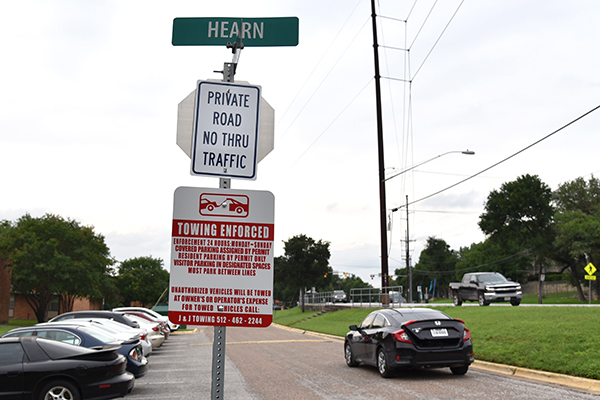Non-University affiliated hikers and bikers injured on UT property would be considered trespassers and unable to sue for damages if UT wins a Texas Supreme Court case.
The issue stems from a lawsuit filed against the University in district court four years ago by cyclist April Garner, 57, who was struck by a UT service truck backing out of a parking space on UT property in April 2015.
UT is claiming Garner was trespassing because she was not affiliated with UT or an invited guest.
Garner, who was thrown from her bicycle and broke her wrist, is seeking up to $200,000 in damages under the Texas Tort Claims Act, which makes governmental entities liable in the case of a motor vehicle accident caused by negligence by a government employee.
UT filed a motion to dismiss Garner’s suit, claiming Garner could not sue UT without proving gross negligence or intentional misconduct.
After a judge denied UT’s motion, the University appealed in 2017, claiming Garner was a civil trespasser under the Recreational Use Statute, a law protecting landowners’ liability when they allow the public to use their land — including government property — recreationally.
Bob Shannon, a justice on the state’s Third Court of Appeals, wrote an opinion in favor of Garner, stating since UT did not open the street where the crash occurred for recreational use, the Recreational Use Statute does not apply, and Garner is not a trespasser.
According to Shannon’s opinion, Garner would also not be considered a trespasser because the road where the crash occurred was not clearly marked by “No Trespassing” signs, and Garner proved the public routinely used it without the University taking steps to prevent public use.
In August 2018, UT appealed to the Texas Supreme Court, claiming Shannon misinterpreted the Recreational Use Statute.
UT also argued Garner mischaracterizes their argument as expanding the Recreational Use Statute to consider all cyclists on UT property as trespassers, including those affiliated with UT.
“Unlike Garner and other members of the general public, however, students, employees or invited guests of UT-Austin would not be trespassers,” UT’s lawyers wrote. “Nor would they be deemed trespassers under … the Recreational Use Statute unless UT-Austin had permitted them to enter the premises for recreation — something categorically untrue of students and employees.”
One of Garner’s attorneys, Jim Rodman, said UT is implying they do not want to be held liable for anyone engaging in recreational activity on University property.
“No college campus should treat a bicyclist or a pedestrian as a second-class citizen on their campus, and that’s, in my mind, what UT is saying,” Rodman said. “They take the most vulnerable people — the bicyclists, the skateboarders and the pedestrians … and say to them, ‘You don’t have a claim.’”
UT spokesperson Shilpa Bakre declined The Daily Texan’s request for comment, saying the University will make its case in court.
The Texas Supreme Court has not yet decided whether they will hear the case.



















